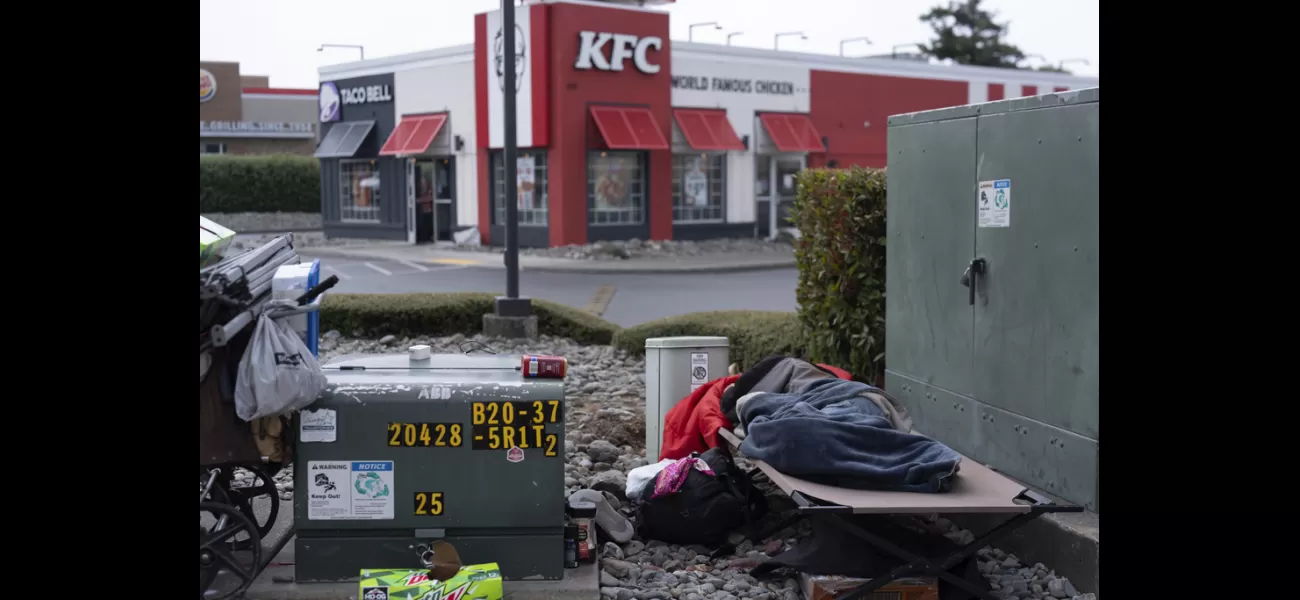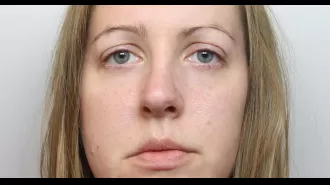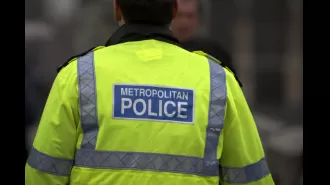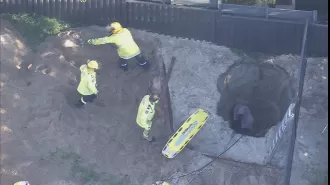Cities can now ban homeless people from sleeping outside following a decision by the US Supreme Court.
Over 650,000 homeless individuals in the US may be impacted.
June 28th 2024.

In a major ruling, the US Supreme Court made a decision yesterday that allows cities to enforce bans on homeless people sleeping outside in public places. This overturns a previous ruling from a California-based appeals court that deemed such laws to be cruel and unusual punishment, especially when there is a lack of shelter space available. The case has been hailed as the most significant ruling on this issue in decades, highlighting the growing number of individuals in the US without permanent housing.
The high court's decision, which was split 6-3 along ideological lines, found that outdoor sleeping bans do not violate the Eighth Amendment. This ruling came after western cities argued that the previous ruling made it difficult to manage outdoor encampments in public spaces, while advocates for the homeless argued that punishing individuals who have nowhere else to sleep would essentially criminalize homelessness.
In California, where one-third of the country's homeless population resides, Democratic Governor Gavin Newsom expressed his support for the decision, stating that it gives state and local officials the authority to clear out "unsafe encampments" from the streets while also acting with compassion. He believes that this ruling removes the legal uncertainties that have hindered local officials for years.
However, Justice Neil Gorsuch, who wrote the majority opinion, acknowledged the complexity of homelessness and the need for various public policy responses to address it. He also suggested that those who are forced to sleep outdoors could raise a "necessity defense" if they are punished for violating camping bans.
On the other hand, homeless advocates argue that allowing cities to penalize individuals who have no other place to sleep will only worsen the crisis. The previous ruling had allowed cities to regulate encampments, but not completely ban people from sleeping outside. Justice Sonia Sotomayor, reading from the bench, dissented from the majority opinion, stating that sleep is a biological necessity and punishing people for something they cannot control is cruel and unusual punishment.
The dissenting opinion also warns that this decision will likely not end the legal battles over camping bans in court. Los Angeles Mayor Karen Bass, a Democrat, criticized the majority ruling, stating that cities should not try to "arrest their way out of this problem" and that the only way to truly address homelessness is to connect individuals with housing and services.
The case originated from Grants Pass, a rural Oregon town that appealed a ruling that struck down local ordinances that fined people for sleeping outside in public parks. The 9th Circuit Court of Appeals, which has jurisdiction over nine western states, had held since 2018 that such bans violate the Eighth Amendment in areas where there are not enough shelter beds.
The mayor of Grants Pass, Sara Bristol, expressed her relief at the ruling, stating that it will allow the city to reclaim its parks for recreation. She also acknowledged the complexity of homelessness and the community's ongoing efforts to find solutions.
The ruling has been praised by attorney Theane Evangelis, who represented Grants Pass before the high court. She believes that this decision will be seen as a turning point in America's homelessness crisis and that the 9th Circuit's ruling had limited the power of local governments.
The impact of this ruling is expected to be limited in cities like Portland and Seattle, where there are separate legal limits on how they can manage encampments. However, an attorney for homeless individuals in Grants Pass expressed disappointment, stating that the majority of the court has allowed a city to punish its homeless residents for simply trying to survive when there is nowhere else for them to go.
This ruling comes at a time when homelessness in the US is on the rise, with a 12% increase reported last year. This is the highest reported level since the country began using a yearly point-in-time survey in 2007. The lack of access to mental health and addiction resources has been identified as a contributing factor to this crisis, and it disproportionately affects older adults, LGBTQ+ individuals, and people of color. Federal data also shows that nearly half of people without housing sleep outside.
Derrick Belgarde, executive director of the nonprofit Chief Seattle Club, believes that some people may choose to sleep outside, especially if they do not feel safe or like they belong in shelters. He fears that this ruling will cause a lot of pain and misery for individuals who have a right to feel safe and a sense of belonging, particularly within the Native American community. The 9th Circuit's ruling had jurisdiction over nine states, including Alaska, Arizona, California, Hawaii, Idaho, Montana, Nevada, Oregon, and Washington.
The high court's decision, which was split 6-3 along ideological lines, found that outdoor sleeping bans do not violate the Eighth Amendment. This ruling came after western cities argued that the previous ruling made it difficult to manage outdoor encampments in public spaces, while advocates for the homeless argued that punishing individuals who have nowhere else to sleep would essentially criminalize homelessness.
In California, where one-third of the country's homeless population resides, Democratic Governor Gavin Newsom expressed his support for the decision, stating that it gives state and local officials the authority to clear out "unsafe encampments" from the streets while also acting with compassion. He believes that this ruling removes the legal uncertainties that have hindered local officials for years.
However, Justice Neil Gorsuch, who wrote the majority opinion, acknowledged the complexity of homelessness and the need for various public policy responses to address it. He also suggested that those who are forced to sleep outdoors could raise a "necessity defense" if they are punished for violating camping bans.
On the other hand, homeless advocates argue that allowing cities to penalize individuals who have no other place to sleep will only worsen the crisis. The previous ruling had allowed cities to regulate encampments, but not completely ban people from sleeping outside. Justice Sonia Sotomayor, reading from the bench, dissented from the majority opinion, stating that sleep is a biological necessity and punishing people for something they cannot control is cruel and unusual punishment.
The dissenting opinion also warns that this decision will likely not end the legal battles over camping bans in court. Los Angeles Mayor Karen Bass, a Democrat, criticized the majority ruling, stating that cities should not try to "arrest their way out of this problem" and that the only way to truly address homelessness is to connect individuals with housing and services.
The case originated from Grants Pass, a rural Oregon town that appealed a ruling that struck down local ordinances that fined people for sleeping outside in public parks. The 9th Circuit Court of Appeals, which has jurisdiction over nine western states, had held since 2018 that such bans violate the Eighth Amendment in areas where there are not enough shelter beds.
The mayor of Grants Pass, Sara Bristol, expressed her relief at the ruling, stating that it will allow the city to reclaim its parks for recreation. She also acknowledged the complexity of homelessness and the community's ongoing efforts to find solutions.
The ruling has been praised by attorney Theane Evangelis, who represented Grants Pass before the high court. She believes that this decision will be seen as a turning point in America's homelessness crisis and that the 9th Circuit's ruling had limited the power of local governments.
The impact of this ruling is expected to be limited in cities like Portland and Seattle, where there are separate legal limits on how they can manage encampments. However, an attorney for homeless individuals in Grants Pass expressed disappointment, stating that the majority of the court has allowed a city to punish its homeless residents for simply trying to survive when there is nowhere else for them to go.
This ruling comes at a time when homelessness in the US is on the rise, with a 12% increase reported last year. This is the highest reported level since the country began using a yearly point-in-time survey in 2007. The lack of access to mental health and addiction resources has been identified as a contributing factor to this crisis, and it disproportionately affects older adults, LGBTQ+ individuals, and people of color. Federal data also shows that nearly half of people without housing sleep outside.
Derrick Belgarde, executive director of the nonprofit Chief Seattle Club, believes that some people may choose to sleep outside, especially if they do not feel safe or like they belong in shelters. He fears that this ruling will cause a lot of pain and misery for individuals who have a right to feel safe and a sense of belonging, particularly within the Native American community. The 9th Circuit's ruling had jurisdiction over nine states, including Alaska, Arizona, California, Hawaii, Idaho, Montana, Nevada, Oregon, and Washington.
[This article has been trending online recently and has been generated with AI. Your feed is customized.]
[Generative AI is experimental.]
0
0
Submit Comment





